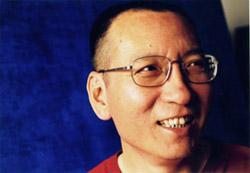Liu Xiaobo and China's future

The Beijing elite's vehement reaction to an imprisoned dissident's Nobel award is a sign of its political vulnerability. By Kerry Brown, cross-posted from OpenDemocracy.net
The award of the Nobel prize for peace to the imprisoned Chinese rights activist Liu Xiaobo on 7 October 2010 is a moment rich in significance for all involved. For the dissident movement in China, it gives its cause a lease of life. For those western governments that have been saying less and less about specific human-rights cases in China, it offers an occasion to reflect on the justness of this course. For the Chinese government, most predictably of all, it presents the chance for another angry burst of rhetoric (and an accompanying clampdown on other critical voices).
Yet Beijing's quaint denunciation of the award as politically motivated is also in its way confirmation of the reality that the prize is indeed political to its core. After all, its recipients have included (apart from genuinely worthy figures) a serving United States president, former terrorists, and (perhaps most galling of all) Henry Kissinger. But that is precisely what makes Liu Xiaobo a particularly appropriate winner.
Many have commented in the days since the award that Liu Xiaobo is far from well known in China, and that his victory will never be significant there. This is irrelevant as well as untrue. The key "targets" of his prize are the members of the central committee of the Communist Party of China (CCP), and especially those who sit on its politburo. This elite certainly knows who Liu is - largely because its authority would have been required to send him to jail for eleven years in December 2009.
Out of control
Now, China's top leaders are forced to respond to this latest piece of western effrontery. The details of their discussions may not be known for a long time, if ever. But when they next convene around the tables of the Zhongnanhai (the central government compound in Beijing) to review their policy of harmonious social development and peaceful Confucian rise, there is bound to be embarrassment that a prize once deeply coveted by the Chinese government is going to a Chinese national in prison in China. It is even more painful than the Nobel literature award to Gao Xinjiang, who was by that time exiled in France.
This is not the way the ultra-controlling Chinese political elite wants things to happen. So when the bad news came, it and the power-sources it commands (including the media) was unable to react in an astute and (perhaps, from its perspective) effective way: by adopting an attitude of lofty disdain towards this insignificant piece of frippery by an ignorant west. Instead it raised the decibels for the entire world to hear.
The elite, by showing how much it cared about Liu Xiaobo's award, thus granted the Nobel committee an even greater success. The latter, by exposing in raw form one of the rare current vulnerabilities of some of the most arrogantly powerful people on the planet, can be well pleased with its work here.
Again, this is indeed a political rather than a cultural issue. The Nobel peace prize should aim to irritate repressive and unpleasant elites - whether in Africa, Asia, the Americas, or Europe. The Chinese say they will set up their own prize to recognise international efforts, perhaps naming it after Zhou Enlai. They could then borrow from Europe and award it to individuals who might be irritating to power groups in the west. This would be very welcome.
In the mirror
More broadly, a definite outcome of Liu Xiaobo's peace prize is that it might mean fewer high-minded lectures from the CCP's "learning orientated leadership" about the party's moral as well as economic prowess. The experience of seeing powerful and ruthless politicians adopt the dress and tone of gentleman scholars or solicitous uncles is already hard enough to stomach; a shift from this humbug and evasion towards realism would be beneficial all round.
China's leaders have in their stewardship of the economy over the last three decades demonstrated that they are competent in this area – perhaps to a level of greatness that no one can deny and which deserves to be celebrated. But the extra dimension so often attributed to them - of being significant figures in cultural, intellectual, and even spiritual terms - is a ludicrous fantasy. In this sense, this Nobel peace prize performs a function equivalent to that of the best political satire in the west, by showing China's communist elite in its true perspective.
Hu Jintao and his colleagues will continue to swim in a sea of serene self-righteousness in the image they seek to present to the world. But amongst the endless self-referential harmony of contemporary official China, this rude interjection will antagonise and unsettle the very people most in need of it.
Perhaps then at their next Zhongnanhai meeting the members of the politburo can begin to reflect on the comic absurdity that they oversee the world's second largest economy, the world's largest holder of foreign reserves, the world's largest exporter - yet rule a country whose sole internationally recognised laureate is incarcerated for exercising his freedom of speech. And, with all this in mind, to take their own adage seriously: "seek truth from facts".
